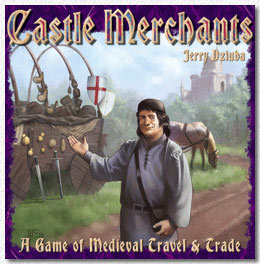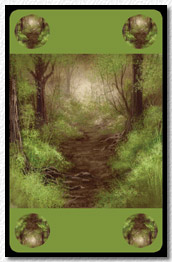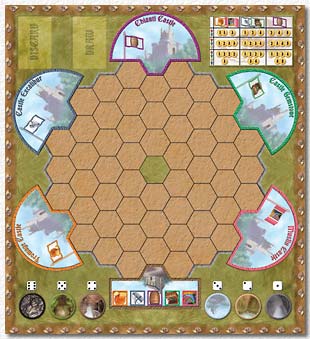
| Designer | Jerry Dziuba |
| Publisher | Z-Man Games |
| released | 2005 |
| Players | 2-4 |
| Playing Time | 75 minutes |
 |
||||||||||
|
||||||||||
reviewed by Moritz Eggert
Z-Man-Games have gathered an impressive line-up of games in recent years. From their humble starts with the card game "Grave Robbers from Outer Space" they have gone to producing the American editions of the wonderful "Il Principe" and "Reef Encounter", as well as some very nice games of their own making, like "Ideology" and "Camelot Legends". Their new "big" board games at Essen were "Parthenon" and "Castle Merchants", both pretty lushly produced games with big, tightly filled game boxes.
"Castle Merchants" is basically a racing game, not really a trading game, as the title suggests. Players compete to sell their wares at various castles placed conveniently around the hexagonal board. These castles are aptly named after the wares they prefer, which makes one wonder why a castle called Chianti Castle doesn't produce the stuff itself but has dubious peddlers sell it to them at cutthroat prices, but I digress…
Being the first to sell wares at a castle gives certain advantages, you'll get more Gold Pieces for example (they double as VP - as I said, this is NOT a trading game) than the traders that follow second or third.
But movement around the board is where the fun starts. The poor castle merchants not only have to rush to the castles before their opponents do, they also have to create the terrain they travel to as well, and then play cards to actually traverse the terrain tiles. You see, being a medieval trader was anything but easy…
When it's your turn you can:

When you dare to roll the terrain tile (how dare you!) you roll one of the terrain symbols and can then place one of these terrains on the board or move an already existing terrain tile of this kind to another space or remove a terrain tile of this kind from the board. One should also add that it is possible to roll the terrain die for free when you just sold your junk at a castle - while having a Chianti and cheese with it, I guess.
One already can guess that terrain cards of the right kind are in high demand. To get them you have to either pass or go to the lawn space in the middle of the board to regenerate. But passing is what you will mostly have to do, probably 50% of the time - which can become a little boring after a while…

Once you have sold most of your wares you can also return to the warehouse to stock up, in fact this will usually always be necessary at least once to win the game, as to earn 18 GP's means you will have to visit some castles several times.
The game plays along at a good pace and is certainly a solid design, but one thing that players will realise quickly is that it is much less strategic than it pretends to be. You need certain cards to play a certain tile, but then you need the same type of card AGAIN to traverse the terrain you just created. Of course you will often travel through terrain created by others later in the game, but especially at the beginning a good hand will help you a lot. In our game I had a good start with some lucky matching cards (I was also the first to move) and could create a headstart that the other players never really could overcome. Although it is possible to hinder players with the landslide or with evil use of the terrain die these actions actually have a kingmaker problem, as they won't really help the perpetrator. In a way this creates the "Who Killed Doctor Lucky effect", (players who know this awful game will know what I mean) which means all players play against the current leader until they simply run out of possibilities to do so, a mechanic which is more than problematic.
| Characteristics | |
|---|---|
| Playing the game: | 90 minutes (four players) |
| Explaining the rules: | 10 minutes |
| Box: | big |
| Counters/Tiles: | heavy stock - nice! |
| Medieval Atmosphere: | nonexistent apart of the title - this is a pure racing game, nothing more, nothing less |
| Diet: | recommended for the guy on the cover |
| Overall: | not a filler game, not a "heavy" game, something in-between |
On the positive side this is a pretty straightforward game that can be taught quickly and which is neither opaque nor dull. Usually the players will either move clockwise or counter-clockwise around the board to visit all the castles, sometimes one player will rush ahead but then will sit somewhere stocking up on cards again. The game material is of good quality and the symbols on the tiles and cards are very nicely done, although one could question a certain "dark" character that is evoked by some of the images which somehow jars with the light-hearted theme of the game. The suggested playing time of 30-60 minutes is also a little too short, especially with 4 players this will be a longer game, perhaps a bit too long for the content.
I don't think Castle Merchants is a bad game in any way, but there is something lacklustre about it, something which is missing but hard to describe exactly. That was our reaction after playing: "nice, but....?". If you look for a gateway game to play with your family this might be the perfect choice, but as a gamer you might be looking for something more "meaty" after all.
| add/read comments |
©2006, Westpark Gamers